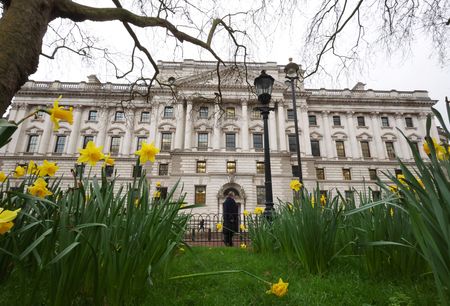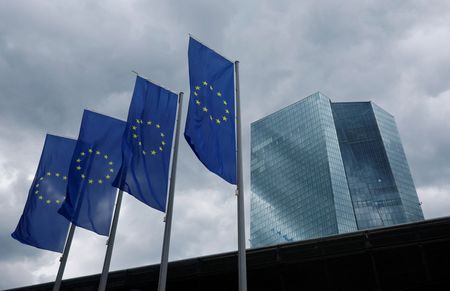By Maria Martinez
BERLIN (Reuters) -Leading German economic institutes on Thursday trimmed growth forecasts for 2025 and 2026, citing headwinds from U.S. tariffs and delays to the boost from higher public spending in an export-reliant economy struggling to regain momentum.
The Ifo institute now expects gross domestic product to expand by 0.2% in 2025 and 1.3% in 2026, shaving 0.1 and 0.2 percentage points from its summer projections. It forecasts growth of 1.6% in 2027.
Germany has struggled to regain momentum after two years of contraction, hit by weak global demand, high energy costs and a slide in industrial output.
“If economic policy remains at a standstill, further years of economic paralysis and erosion of Germany as a business location threaten,” said Timo Wollmershaeuser, Ifo’s head of forecasts.
Ifo estimated Berlin’s planned economic policy would deliver a fiscal boost of 9 billion euros ($10.54 billion) this year, rising to 38 billion euros in 2026 and 19 billion euros in 2027.
The Kiel Institute for the World Economy said business expectations have improved on prospects of higher government spending, but U.S. tariff policy remains a drag.
IfW cut its 2025 growth forecast to 0.1% from 0.3% in June and now sees GDP rising 1.3% in 2026, down from 1.6% previously, and 1.2% in 2027.
Berlin is poised to deploy newly available public funds from 2025, which could lift next year’s growth by about 0.6 percentage points and by 0.3 percentage points in 2027.
The Leibniz Institute for Economic Research RWI expects GDP to expand by 0.2% in 2025, 1.1% in 2026 and 1.4% in 2027, marking downward revisions of 0.1 and 0.4 percentage points versus its summer projections.
From 2026, a fiscal push worth about 0.9% of GDP annually is set to do most of the lifting, the institute said, but warned government spending could not be a permanent substitute for private investment.
“The government spending programmes… do not solve the fundamental competitiveness problems of the German economy,” said RWI chief economist Torsten Schmidt.
The general government deficit is expected to rise from roughly 116 billion euros to just under 158 billion euros in 2026 and to 170 billion euros in 2027.
The three institutes expect the unemployment rate to ease to around 6.0% by 2027 as activity improves, after rising to 6.3% this year. Inflation is expected to oscillate around the European Central Bank’s 2% target over the forecast horizon.
($1 = 0.8542 euros)
(Reporting by Maria Martinez, Editing by Rachel More and Ros Russell)










